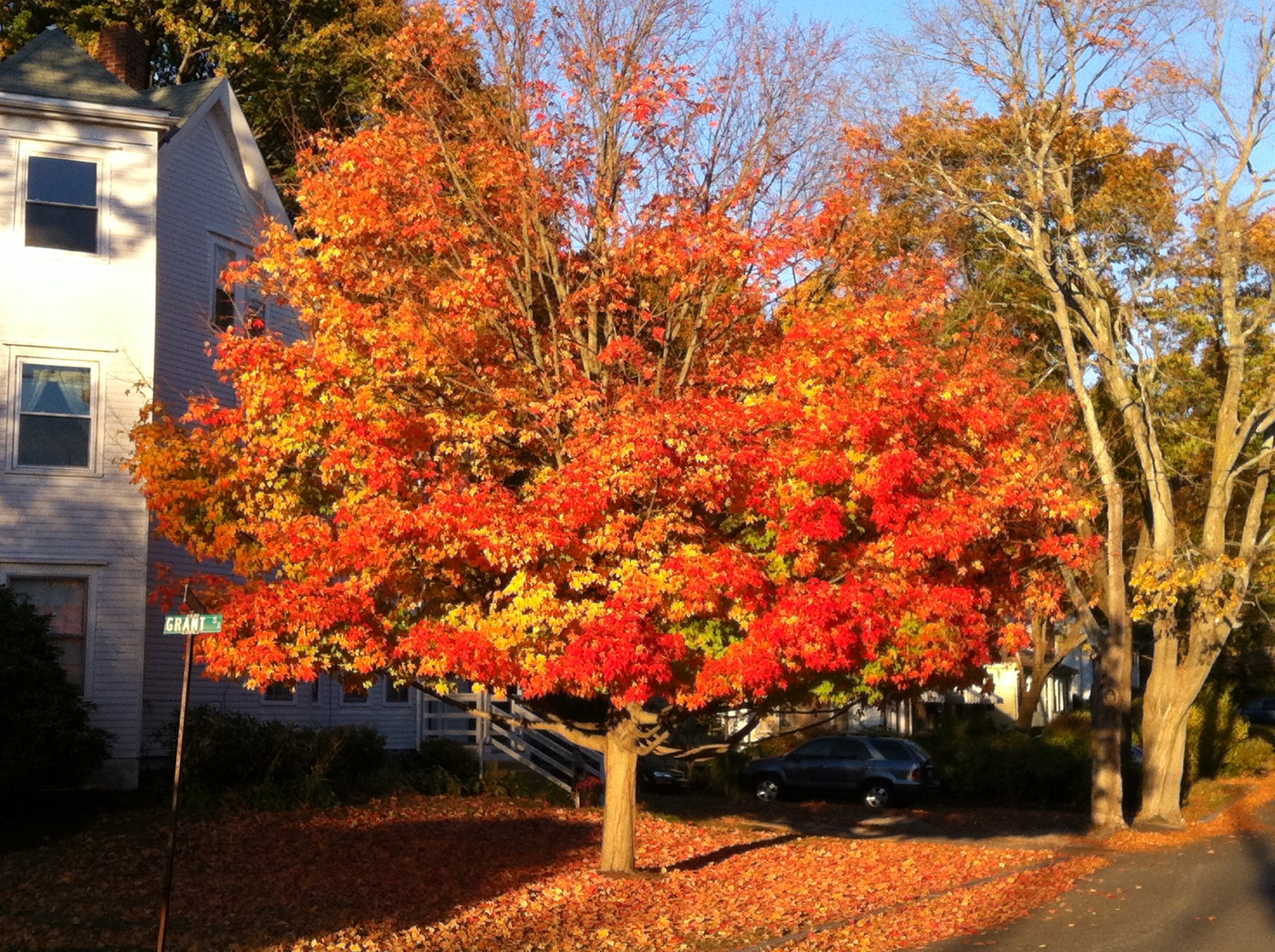Fall is amazing. Awe-inspiring. I turn the corner while driving and can’t stop saying, “Wow!” On my walks in the morning I catch sight of each tree and it reminds me of the finale of the Fourth of July Fireworks where the colors just get brighter and more exciting. It’s as if the Boston Pops are playing in the background.
It was my first car (a mint green Buick that required a quart of oil at every fill up) that put me on a path of true autumn appreciation. Before that, I had taken the bus to work, which took a route on a main road without much nature of any kind. But once I had Bessie (that was her name) I could take the back way—all tree-lined roads in the Boston suburbs. And it was during that fall of ’88 I began the ‘Best Fall Tree of the Day’ Award. It’s a life changing game. It’s your own private Reality TV show. You drive (or walk) and look at all the trees and then suddenly one will appear in all its glory. And you will just know that on this particular day—that tree wins. In fact as soon as you give the award you may notice that the tree shines even brighter from the recognition. Sometimes I announce it out loud to myself in the car “Well done! Bravo! You win!” And sometimes it’s just a quiet nod of recognition. Either way, the tree seems to know and puff up its leaves a little bigger. And every day is different—even on the same commute—the way the light hits it, where the tree is in its progression of color, how it sits in relation to the other trees.
I was working with teenagers at the time, and I rallied them to be on the judges’ panel when we took trips as a group—getting them, uncharacteristically, to look for beauty in the world. And then when I worked for a few years as a rowing coach I would encourage my athletes to do the same—to look when they were running, or had taken a break from rowing for the most beautiful tree --to add a bit of appreciation of the natural world into a morning of exhaustion from exercise.
Most people are now familiar with the practice of gratitude—the idea of writing down at the end of each day, something you are grateful for—as a way to build muscles for seeing what you do have in your life, rather than what is missing. And to that practice I would recommend the simple game of “Best Fall Tree of the Day” as a way to build the practice of “Awe” because it turns out that our capacity for awe has some pretty “awesome” properties.
Awe is one of the positive emotions with an interesting effect: it makes us feel smaller and yet connected to a larger whole. And the research on awe shows that even brief experiences of awe make us more generous, more helpful—generally more pro-social, and better community members. According to the research, it didn’t seem to matter what it was that inspired awe: beautiful nature, frightening nature, in reality—or memory—all of it shifted the behavior of the research participants to be less self-interested and more interested in the lives and problems of others. It turns our, we may become our biggest and best selves, when we can feel our ‘small self.’ And awe is our pathway to finding our small, but generous self.
Our best stewards of awe may be our poets and our artists. Read any poem by Wendell Berry, Rilke or Mary Oliver and come away stunned by the awe they capture in language and image. Look at Georgia Okeefe’s flowers or Monet’s Water Lilies. As human beings we are all capable of awe, but artists teach us how to keep it, they give us language for it, they provide the possibility that we could share it with others.
Over the years I have expanded the Reality show to match the season: Best Holiday Lights Display, and Best Flowering Garden to keep up my practice of looking for beauty, for looking for awe once the leaves had fallen. So I challenge you to have an awe-some day—find your moment of awe—let it fill you—and share it with others if you can.
© 2024 Gretchen L. Schmelzer, PhD
You can read the original research article on awe by Piff et al here. Or a New York Times summary of the research on awe here.




